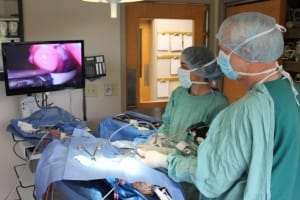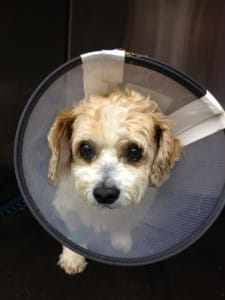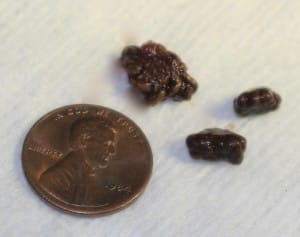Laparoscopy at Care First Animal Hospital
August 16, 2013
FOR IMMEDIATE RELEASE— August 16th, 2013
Care First Animal Hospital, Raleigh NC becomes one of the first private veterinary practice in the area to offer laparoscopic spays, a revolutionary new veterinary surgery which enables patients to be 65% more comfortable post-operatively.
Raleigh, NC, August 2013 – Care First Animal Hospital strongly believes that spaying or neutering your pet imparts important health benefits, and now offers a less invasive and more comfortable alternative to the traditional spay procedure. Laparoscopy or Minimally Invasive Surgery has become the standard in human medicine and now is being shown to significantly improve the quality of our pet’s lives.
By incorporating a state of the art endoscopy system from VetOvation, Inc. Care First Animal Hospital has introduced human technology and technique into veterinary medicine. Laparoscopy allows veterinarians to perform less invasive and more comfortable surgical procedures such as spays, diagnostic biopsies, and sinus explorations. Utilizing two or three tiny keyhole incisions and specialized tissue sealing techniques (rather than a larger incision and internal sutures), the laparoscopic method provides less tissue bruising, minimizes blood loss, and eliminates the risk of internal suture reactions. A pet is not required to be confined after laparoscopic surgery, generally does not require pain relief medication, and has a faster recovery time. Magnification provided by the laparoscope (camera) improves visualization of the organs and allows for better diagnostics.
“Traditional spay methods are safe and effective,” said veterinarian Dr. Joe Gordon of Care First Animal Hospital, “however, we feel the laparoscopic approach allows numerous benefits to the pet, and are pleased to offer this advanced technology to our patients.”
The new technology can be used for more than just spaying a dog. Jesse, a dog with the SPCA of Wake County, recently required surgery to remove large bladder stones. As he also has liver disease, the laparoscopic procedure was chosen as a safer method, minimizing Jesse’s post-operative pain and allowing him to go back to foster care the very next day.
By performing spays laparoscopically, Care First Animal Hospital offers their patients more comfort and reduced recovery time, while safely performing the procedure as an outpatient surgery; a more comforting alternative for patient and owner. In addition, the laparoscopic spay involves few complications and allows for better visualization of abdominal organs.
In summary, the laparoscopic spay is a humane and practical method to spay your pet, and this state of the art technology is now available in the Triangle area.
#######
Contact
Heather Cutchin Evans
Care First Animal Hospital
1216 Oberlin Road
Raleigh, NC27608
Phone 919-832-3107
Cell 919-414-3379
Fax 919-834-4045
hcutchinevans@carefirstanimalhospital.com
www.carefirstanimalhospital.com
*Devitt, Chad, DVM, MS, DACVS. “Duration, Complication, Stress and Pain of Open Ovariohysterectomy Versus a Simple Method of Laparoscopic-Assisted Ovariohysterectomy in Dogs.” Journal of the American Veterinary Medical Association Volume 227, Number 6 (September 15, 2005).
Back to Blog



